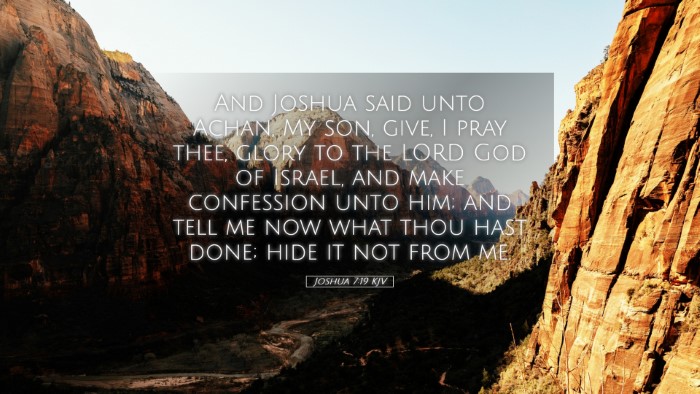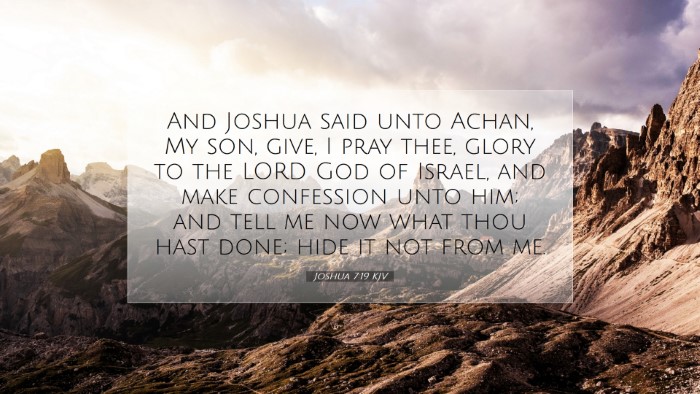Commentary on Joshua 7:19
In Joshua 7:19, we witness a pivotal moment in the narrative of Israel's conquest of Canaan, particularly in relation to the sin of Achan. This verse, where Joshua confronts Achan, serves as a profound reminder of the consequences of disobedience and the importance of accountability. The insights provided by public domain commentaries, such as those by Matthew Henry, Albert Barnes, and Adam Clarke, offer rich theological and practical reflections on this passage.
Contextual Overview
The context of Joshua 7 is significant for understanding the gravity of Achan's sin. After a stunning victory at Jericho, Israel faces defeat at Ai due to Achan's theft of devoted items. This chapter underscores the principle that sin in the camp can lead to national calamity.
Analysis of the Text
Joshua 7:19 states:
"And Joshua said unto Achan, My son, give, I pray thee, glory to the Lord God of Israel, and make confession unto him; and tell me now what thou hast done; hide it not from me." (Joshua 7:19, KJV)
Exegesis by Matthew Henry
Matthew Henry emphasizes the compassionate approach of Joshua in confronting Achan. He notes that Joshua addresses Achan as “my son,” reflecting a pastoral concern. This indicates that confession is not merely a legalistic requirement but an act that restores one’s relationship with God. Henry suggests that Joshua’s exhortation to “give glory to the Lord” implies a recognition of God’s sovereignty and holiness.
- The Importance of Confession: In urging Achan to confess, Joshua highlights the necessity of verbal acknowledgment of one's sins. This act of confession serves to glorify God as the just judge and merciful redeemer.
Insights from Albert Barnes
Albert Barnes provides further depth by discussing the implications of Achan's actions for the wider community of Israel. He points out that sin is communal and impacts the whole body of believers. When Joshua implores Achan to tell the truth, he emphasizes the importance of transparency in the body of Christ.
- Community Accountability: Barnes argues that the church today must heed this principle; individual actions can hinder collective progress and blessing.
- God’s Glory in Confession: The call to give glory to God is a recognition that acknowledgment of wrongdoing is not only about personal guilt but about restoring God’s honor, which has been compromised by personal sin.
Theological Reflections from Adam Clarke
Adam Clarke offers a nuanced theological interpretation, focusing on the nature of divine justice and mercy. He notes that the divine imperative for Achan to reveal his sin serves a dual purpose: it enacts God’s judgment while also providing an opportunity for repentance.
- Divine Justice and Opportunity: Clarke suggests that this encounter illustrates God’s desire for repentance over punishment. The request for confession reveals God’s character as a forgiving deity who desires that none should perish but that all should come to repentance.
- Achan's Choice: Achan stands at a crossroads, facing the choice of confession and returning to God’s favor or remaining in his hidden sin, illustrating the tension between divine grace and human responsibility.
Application for Pastors and Theologians
The message of Joshua 7:19 holds significant implications for modern ministry:
- Encouraging Confession: Pastors are called to create safe environments for confession and accountability within their congregations, reflecting the approach of Joshua.
- Emphasizing God’s Holiness: The emphasis on giving glory to God remains crucial in today’s preaching, as it reaffirms God’s holiness in the face of human sinfulness.
- Community Dynamics: The communal aspect of sin and confession highlights the need for corporate encouragement and maintaining integrity within the church body.
The Broader Narrative
Furthermore, this passage connects to the broader narrative of Israel’s journey in the Promised Land. The victory at Jericho was contingent upon Israel's faith and obedience, which was tarnished by Achan's transgression. When viewed through the lens of redemption, Achan's moment serves as a cautionary tale about the impacts of sin while simultaneously pointing toward the grace provided through confession.
Concluding Thoughts
Joshua 7:19 serves as a crucial reminder of every believer’s responsibility to uphold holiness, restore relationships through confession, and acknowledge the sovereign authority of God. As we glean insights from the works of Henry, Barnes, and Clarke, we are called to consider how we might cultivate an honest and vibrant spiritual community that underscores both the seriousness of sin and the greatness of God’s mercy.


